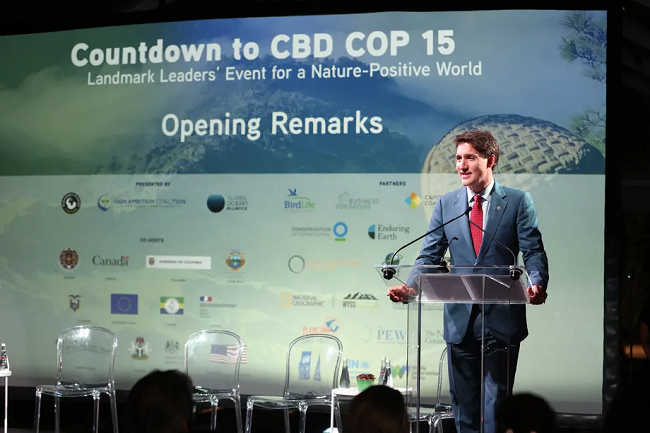By 2030, 30 per cent of the planet’s land and sea areas should be protected. All subsidies leading to the degradation of nature should be reallocated. These are two of the recommendations from the Leibniz Research Network Biodiversity’s “10 Must Dos”. The researchers are publishing their proposals on the occasion of the United Nations’ COP15 World Conference on Nature, which begins on Wednesday, December 7, 2022, in Montreal, Canada.

Delegates from over 190 countries are coming together at the UN Biodiversity Conference to hash out a plan to halt the decline of ecosystems, wildlife, and the life-supporting services they provide.
“Nature provides the live support systems for humanity – we must safeguard these,” explains Kirsten Thonicke of the Potsdam Institute for Climate Impact Research, spokesperson for the research network. “Nature benefits us, but we harm nature. Species extinction, climate change, damage to natural habitats – in the end, all this affects us. When forests shrink, for example, due to logging or increasing droughts, it reduces their performance as carbon sinks and for water cycles. Biodiversity is not just about birds and bees, it’s about the Earth system as a whole. Hence these ‘10 Must Dos’.”
The authors based their recommendations on the state of research, as published in reports by the Intergovernmental Science-Policy Platform on Biodiversity and Ecosystem Services (IPBES) and others. The upcoming COP15 United Nations Biodiversity Conference, chaired by China and attended by representatives of governments from nearly every country in the world, is expected to result in a global framework agreement for biodiversity conservation. The outcome is open.
Redirect subsidies to preserve nature instead of destroying it
“The World Nature Summit in Montreal will decide the fate of biodiversity,” says Katrin Böhning-Gaese of the Senckenberg Biodiversity and Climate Research Centre, who has herself participated in biodiversity conferences of the United Nations and the World Biodiversity Council. “Biodiversity is not a luxury. It secures our human existence. Biodiversity provides food, clean water and medicines. It keeps ecosystems functioning. We need biodiversity for our health, our identity. So, the World Nature Summit is about whether we and our children and grandchildren can live well on Earth in the future.”
In concrete terms, this is also about money. In agriculture alone, around $540 billion in public subsidies are spent every year. “Instead of handing out environmentally harmful subsidies, the funds should be used to preserve biodiversity,” says economist Martin Quaas of the German Center for Integrative Biodiversity Research (iDiv). “After all, it should also be economically worthwhile for farmers to maintain ecosystem services that are valuable for all of us.”
The “10 Must Dos from Biodiversity Science” can be accessed here: https://zenodo.org/record/7361181#.Y43J7X3MJaR . The Leibniz Research Network Biodiversity can be accessed: https://www.leibniz-biodiversitaet.de/en .
Researchers that contributed to the “10 Must Dos” have been commenting on the development.
Almuth Arneth, Karlsruhe Institute of Technology, said: “Biodiversity, the variety of genes, organisms and ecosystems, is simply the basis of life that ensures human survival. Why we humans do not manage to stop the progressive loss of biodiversity and ultimately call our own livelihood into question – as, incidentally, also in the case of progressive climate change – is a mystery. In any case, it does not seem to be particularly ‘sapiens’.”
Aletta Bonn, Helmholtz Centre for Environmental Research and German Centre for Integrative Biodiversity Research (iDiv) Halle-Jena-Leipzig: “Naturally healthy and content! We need to address biodiversity, climate, and health altogether as our well-being depends on a healthy state of nature. If we learn to comprehend nature as basis for our lives and as enjoyment, we may find sustainable and nature-based solutions for the current large societal challenges.”
Bettina Matzdorf, Leibniz Centre for Agricultural Landscape Research: “We need clear environmental policy frameworks for agriculture as well as a long-term and flexible remuneration system for biodiversity and other ecosystem services. We will only develop the diverse agricultural landscapes that are necessary for the conservation of biodiversity together with motivated farmers.”
Bernhard Misof, Leibniz Institute for the Analysis of Biodiversity Change: “Biodiversity conservation means securing the future. We see that despite many decades of warnings, we have not managed to reverse the trend in global biodiversity loss. A future for next generations is therefore uncertain. The unsatisfactory outcome of the Global Climate Summit in Egypt is an expression of this lack of ability to act. We as scientists are challenged to propose clear and unambiguously applicable metrics for the protection of biodiversity as a basis for political decisions and societal developments. Science, too, is in a debt of gratitude.”
Tonjes Veenstra, Leibniz Centre General Linguistics: “About 5,000 indigenous peoples remaining on earth depend on an intact nature as hunters, gatherers, and fishermen. By losing their languages, we not only lose their knowledge about biodiversity, but also their traditional ecological knowledge that is fundamental in preserving and sustaining their natural habitat. Therefore, granting land titles to indigenous peoples and local communities is of the utmost importance to the retention of their knowledge of the surroundings they live in.”
Wolfgang Wende, Leibniz Institute of Ecological Urban and Regional Development: “Renaturation and extensive restoration of habitats for more biodiversity is a real task for the future but urgently needed in view of species extinction, says Professor Wolfgang Wende of the Leibniz Institute of Ecological Urban and Regional Development.”
